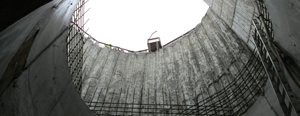Understanding the importance of durability is growing throughout the construction industry, especially with regards to concrete. The more durable a concrete structure is, the longer a lifespan it can withstand.
Where a structure is being built and what environmental conditions it must endure can certainly effect the length of time concrete will last. To withstand such a barrage, the concrete must be built with durability top-of-mind.
As relayed in previous posts on durability testing, it is somewhat difficult to achieve. Along with the absorption test discussed last week, the Rapid Chloride Permeability (RCP) test is another method used to figure out concrete durability; however, is loaded with limitations.
The RCP test is the standard test method for electrical indication of concrete’s ability to resist chloride ion penetration. Methods – such as ASTM C1202, Standard Test Method for Electrical Indication of Concrete’s Ability to Resist Chloride Ion Penetration – consists of monitoring the amount of electrical current passed through cylindrical specimens for six hour duration. After that time, the total charge passed relates directly to the resistance of the sample specimen to chloride ion penetration.
The RCP test is quick and easy, but there are limitations that make the durability test unreliable:
- Allows for premature measurements;
- High voltage can lead to an increase in temperature, which causes physical and chemical changes, which results in skewed values;
- Can be misleading results due to chemical composition of pore solution, rather than from true permeability;
- Concrete resistivity, rather than permeability, is measured; and
- Low inherent repeatability and reproducibility.
Also, if a concrete mix is using a supplementary cementitious material (SCM) and other chemical admixtures may have unrealistic results. The electric current used to pass through the sample during the test indicated the movement of not just chloride ions, but all ions.
Overall, the ASTM test method is suitable for the evaluation of materials and material proportions for design purposes and research. Unfortunately, its limitations are too vast to be used to evaluate the durability of concrete. RCP can qualify a mix, but not necessarily disqualify it, and should not be used to test permeability of a concrete mix containing SCMs or chemical admixtures.
However, there is one more test available that tests the true permeability of concrete; the Water Permeability Test.
Stay tuned next week!





